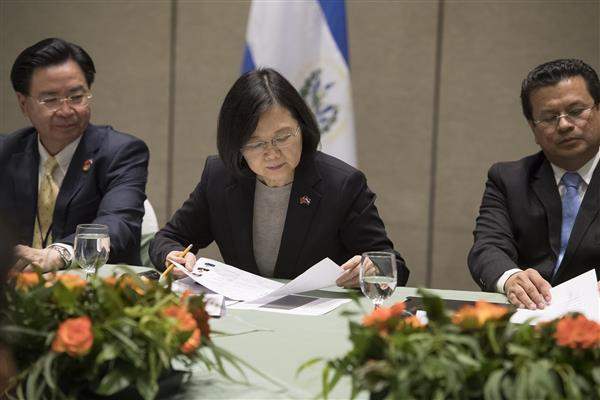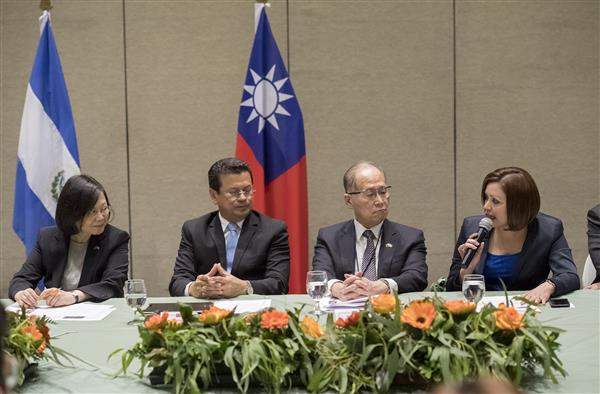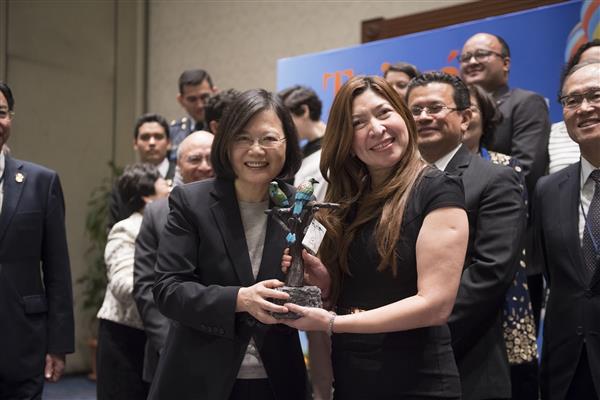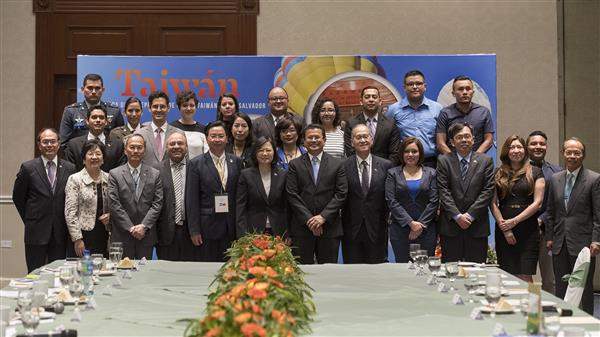News & activities
 News releases
News releases
At 6:00 p.m. on Thursday, January 12 local time (8:00 a.m. on January 13 Taipei time), President Tsai Ing-wen and her accompanying delegation, who are currently in Central America on a trip codenamed the "Ing-Jie Project," met with a group of former recipients of Taiwan Scholarships and other Salvadoran youth.
In remarks, President Tsai noted that this meeting with young Salvadorans was the first item on the delegation’s itinerary following their arrival in El Salvador. Their energy and vitality, said the president, gave her a wonderful first impression of the country.
President Tsai pointed out that Taiwan has always placed great importance on the cultivation of talent. We believe that talented people are the source of a country's long-term competitiveness, she said, which is why we are willing to help diplomatic allies train the talent needed for national development. Under the Taiwan Scholarship program and the TaiwanICDF International Higher Education Scholarship Program , for example, some 400 young Salvadorans have received scholarships since 2003 to study in Taiwan.
The president mentioned that this type of educational cooperation is mutually beneficial. For students in Taiwan, Salvadoran students come here and bring a whole other world with them. Many Salvadoran students have developed friendships with their Taiwanese counterparts, and have even partnered to start new businesses. President Tsai shared the story of Taiwan Scholarship recipient Andres Escobar.
At National Chengchi University, Mr. Escobar joined with his Taiwanese, Canadian and Honduran classmates to form an international team called IMPCT that sought to act as a social enterprise to establish a "platform for investment in education" and provide better early education to children living in poor and remote areas. On the strength of their IMPCT concept, the team won the 2014 Hult Prize Challenge, the biggest international prize competition for innovative young social entrepreneurs emerging from the world's universities . Since then, Mr. Escobar has established the first early education center for children from underprivileged areas in El Salvador, and has gained the support of local residents.
The president mentioned that she had actually met last year with one of the team members, An-Nung Chen (陳安穠 ), who took the same approach to promote early education for children in indigenous communities in Taiwan, with instruction offered primarily in indigenous languages.
The Taiwan Scholarship program and the TaiwanICDF International Higher Education Scholarship Program, said the president, are catalysts that enable young Salvadorans and Taiwanese to explore the future and work together to change the world. Also on hand at the meeting was Diego Echegoyen, the author of El Pais Que Viene ("The Country that is Coming "). President Tsai was very interested in what they have been doing.
Several of the young Salvadorans at the meeting then spoke about their experiences. Andres Escobar said that among all types of investment, education is the one that yields the greatest rewards, and education is the biggest gift he received from Taiwan, because the scholarship completely changed his life. Now he hopes to promote education in remote districts with the support of the governments of El Salvador and Taiwan.
Mirna Nery Vasquez Perez, who attended a TaiwanICDF training course in 2001 and now heads a "TaiwanICDF alumni association," stated that when she worked for the government she had the good fortune to receive a scholarship to attend a short course in Taiwan on tax matters. The scholarship afforded her a chance to take part in bilateral cultural exchange, and enabled her to sharpen her professional expertise. Now, said Ms. Vasquez, she hopes to take advantage of the experience, knowledge, and skills that she picked up in Taiwan to do a better job and contribute to national development.
Oscar Tadeo, an international projects consultant to the Salvadoran Ministry of Economy's National Commission for Micro and Small Enterprises, said that he has created a fashion label under his own name. Commenting on the topic of starting a business, he stated his view that people in difficult circumstances can use resources and seize opportunities to improve their environment and create better lives for themselves. He also encouraged young people to pursue their dreams. The door to success won't open itself, he said. You have to make an effort.
After listening to the stories of the former scholarship recipients and the other Salvadoran youth at the meeting, President Tsai stated that Taiwan, in addition to educating its own young people, also hopes that more young people from other countries can come to Taiwan to study and grow. Besides scholarship programs, Taiwan also intends to increase its youth entrepreneurship programs, and welcomes youth from cross-border groups to study in Taiwan so that they can pursue their dreams and reach their goals.












